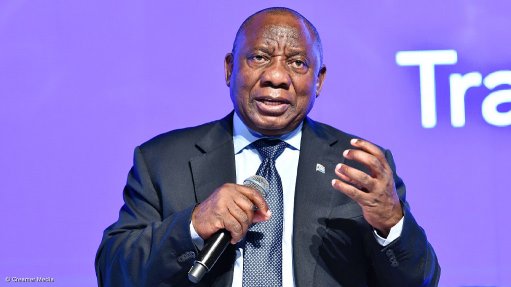
President Cyril Ramaphosa speaking at the inaugural Business Economic Indaba in 2019
Photo by: Creamer Media's Dylan Slater
Business Unity South Africa’s (Busa’s) second Business Economic Indaba will focus on five key issues confronting South Africa, including energy security, when it convenes on January 14 in Johannesburg.
The gathering, which will be held under the theme ‘Activating Actual Outcomes’, takes place amid persistently low growth, rising fiscal stresses, the threat of a downgrade by Moody’s and renewed load-shedding fears as Eskom’s coal-fired power plants continue to underperform.
There is also growing frustration at the lack of progress in initiating bidding processes for the procurement of new generation capacity, despite the fact that the Cabinet-endorsed Integrated Resource Plan 2019 outlines an urgent need for between 2 000 MW and 3 000 MW to address a gap that has emerged as a result of a lower-than-anticipated energy availability factor from Eskom’s existing coal fleet and a derating of the Medupi and Kusile power station units relative to their original nameplates.
The energy issue was again flagged by the International Monetary Fund (IMF), following the conclusion of its 2019 Article IV Mission to South Africa.
In a statement released on November 25, the IMF reiterates that unreliable electricity supply has exacerbated the country’s growth constraints.
“The planned turnaround of the energy sector will have to be supported by (1) a fully competitive environment for electricity generation with private-sector participation, including accelerating the licensing of new private power plants and expediting the bids for independent power producers; and (2) transparently managed and independent energy transmission and distribution entities. “Financial options that leave aside the needed operational and structural changes, such as debt transfers to special-purpose vehicles, must be avoided, as they would not address the underlying vulnerabilities and could act as disincentives to making the needed reforms,” the IMF asserts.
Busa reports that President Cyril Ramaphosa has accepted its invitation to the event, to which Finance Minister Tito Mboweni, Trade. Industry and Competition Minister Ebrahim Patel, Public Enterprises Minister Pravin Gordhan, Mineral Resources and Energy Minister Gwede Mantashe and Employment and Labour Minister Thulas Nxesi have also been invited.
Prominent business leaders, including those from Busa-affiliated business associations, chairs and CEOs of blue-chip corporates, local and international partners and associates will be in attendance.
Besides energy, the other four areas of focus include enabling a capable State, critical sectors for economic growth, the structure of the economy, and the Fourth Industrial Revolution.
To increase participation in the indaba, Busa has launched a set of social media platforms to enable people to contribute to the conversations before, during and after the indaba.
It has also invited young South Africans to submit two-minute video recordings on the five topics. By making submissions, the individuals stand a chance of being selected to present their ideas to business and government leaders at the 2020 gathering.